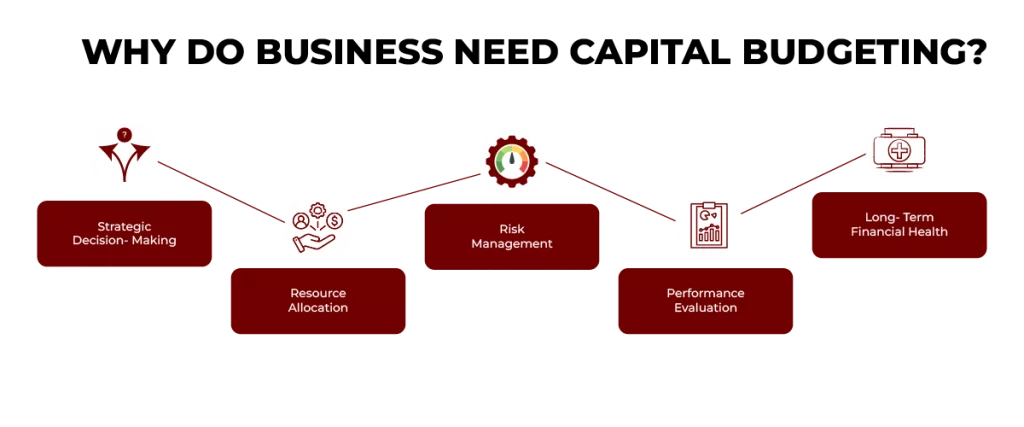Businesses have many challenges when deciding where to put their limited resources. From handling risks to making sure they make money in the long run, every choice is important. One important tool that helps with these issues is capital budgeting.
Capital budgeting helps businesses look at potential investments by checking their costs, returns, and risks. This process not only keeps finances stable but also makes sure resources go to projects that match long-term goals.
Without a proper plan, companies may waste money on projects that do not give good returns or put them in unnecessary financial danger. This is why capital budgeting is very important. Let’s look at why capital budgeting matters and how it helps businesses stay strong.
Let’s understand the importance of capital budgeting and its contribution toward sustainable growth.
Also read: Capital Budgeting in Financial Management
What is Capital Budgeting?
Capital budgeting is the process of analysing long-term investments such as buying machinery, expanding facilities, or entering a new market. It is not just about daily expenses but about choices that determine the future of a company.
The process enables organisations to determine whether an investment will improve growth, profitability, and market position. For instance, determining whether obsolete machinery should be replaced to improve operational efficiency involves detailed analysis—this is the core of capital budgeting.
Importance of capital budgeting:
- Assesses and measures the value of a project throughout its life cycle.
- Helps rank projects or investments based on their profitability and capital requirements.
- Guides investors in identifying worthwhile investment opportunities.
- Assists in making informed decisions for projects involving substantial capital and long durations.
- Defines costs, return on investment (ROI) timelines, and the feasibility of projects.
- Monitors project progress and evaluate investment efficiency.
- Influences future costs and facilitates business growth.

POSTGRADUATE PROGRAM IN
Financial Analysis, Valuation, & Risk Management
Learn financial modeling, valuation techniques, and risk management to drive strategic business decisions.
The Need for Capital Budgeting in Business Decision-Making

Optimal Resource Allocation to Maximise Returns
Every business has limited resources. Capital budgeting helps allocate these resources to projects that will yield the best returns. Techniques such as NPV in capital budgeting can guide the decision by showing which option will yield higher returns over time.
Risk Mitigation Through Strategic Financial Planning
Investments are fundamentally linked with risk. Based on the analysis of the projected inflow of funds and other extrinsic factors, capital budgeting helps businesses foresee and prepare themselves for possible dangers. By using IRR, the organisation can judge whether the project would generate sufficient profit to pay off the amount of risk incurred.
Generating Sustainable Growth and Organisational Resilience.
Capital budgeting focuses on projects that ensure sustainability. Businesses can focus on initiatives that promote long-term stability, such as investing in technology upgrades or infrastructure improvements. They can use Payback Period calculations to determine which investment will stabilise operations faster.
Also Read: Different Techniques of Capital Budgeting for Investment and Risk Analysis
What is the Importance of Capital Budgeting?
Maximising Shareholder Wealth and Confidence
Shareholders invest in businesses with the hope of growth and profitability. Capital budgeting instils confidence by ensuring that investments are aligned with these expectations. When companies invest strategically, shareholders see improved returns and are more likely to reinvest, driving overall growth.
Improving Financial Discipline and Controlling Expenditures
Financial discipline is crucial for sustainability. Capital budgeting introduces a disciplined way of cost analysis, preventing costs from spiralling out of control. Companies can use the Profitability Index (PI) to balance benefits against potential costs.
Maintaining Competitiveness in a Changing Market Environment
Companies are constantly exposed to dynamic markets. Maintaining competitiveness calls for continuous evaluation of opportunities. By capital budgeting, companies will be able to identify which projects will give them an edge.
Other Key Importance of Capital Budgeting
- Decisions with a long-term vision influence future costs and growth.
- Capital budgeting supports the wise allocation of substantial investments, minimising risks to business sustainability.
- It ensures controlled and well-monitored spending, transforming good projects into profitable outcomes.
- Streamlines communication across decision-makers, leading to informed investment choices.
- Helps evaluate long-term projects that involve high risk and impact organisational liquidity.
- Prepares for uncertainties tied to permanent fund commitments and fluctuating returns.
- Simplifies management of tedious, continuous fixed-asset investments.
- Promotes job creation, economic development, and increased per capita income through new projects.
Also read: Capital Structure in Financial Management
Explain the Importance of Capital Budgeting for Businesses
Capital budgeting is not just about choosing projects; it’s about achieving goals that strengthen a business. Here are the primary objectives it fulfils:
- Maximisation of Returns for Shareholders
- Managing risks strategically
- Aligning Investments with Strategic Goals
- Ensuring Optimal Use of Limited Resources
1. Maximisation of Returns for Shareholders
Investments should create value for the shareholders. Projects with hefty profit potential are selected first, ensuring that returns meet or exceed expectations.
When a company made a decision to modernise its old manufacturing technology, it did so not just for efficiency but also to boost profits for the shareholders.
2. Managing risks strategically
Every investment involves risk. The risk profile presented by capital budgeting is built from the knowledge of such risks and an assessment of whether or not the expected profits would overwhelm them. The management would do necessary calculations to determine the feasibility of any proposal using methods such as the IRR.
3. Aligning Investments with Strategic Goals
Capital budgeting will ensure that projects are aligned with long-term business goals. Be it the improvement of operational efficiency or expansion into new markets, the focus will always be on sustainable development.
4. Ensuring Optimal Use of Limited Resources
Because the resources are limited, capital budgeting maximises their utilisation. Instead of making too many investments in many avenues, the business will focus on making a few investments that take the cake.

82.9%
of professionals don't believe their degree can help them get ahead at work.
Importance of Capital Budgeting Decisions for Sustainable Business Growth
Capital budgeting is more than a financial tool—it’s a strategic necessity. Here’s why it’s indispensable:
Guides Long-Term Strategy
- It ensures investments support organisational goals and adapt to market changes.
Boosts Financial Stability
- By prioritising high-value projects, businesses strengthen their financial position.
Enhances Competitiveness
- Investing in innovation and efficiency keeps companies ahead in dynamic markets.
Manages Risks Effectively
- Structured decision-making reduces exposure to uncertainties.
Also Read: Scope of a Career in Financial Management in 2025
Conclusion
Capital budgeting enables the assessment, allocation, and management of resources, facilitates risk management, and helps achieve long-term growth. It provides a structured mechanism for pooling investments, ensuring their relevance to organisational goals and financial constraints.
Techniques such as NPV and IRR allow an organisation to make a complete decision aligned with its maximum return on sustainability.
Economic conditions, regulatory requirements, and risk tolerance will dictate these types of decisions, indicating careful planning is important.
The need for capital budgeting in addressing challenges or prioritising projects is apparent because it guides businesses toward stability and competitiveness.
The importance of capital budgeting for any business lies in its capacity to encourage sustainable growth while managing risks efficiently. This makes it an essential component of sound financial management.
To further your specialisation in financial decision-making and technologies, you may take the Integrated Program in Finance and Financial Technologies offered by Hero Vired. This course is tailor-made for developing mastery of cutting-edge financial strategies and tools to position yourself as a leader in a changing financial world.
Explain the importance of capital budgeting for businesses
- Maximisation of returns for shareholders
- Managing risks strategically
- Aligning investments with strategic goals
- Ensuring optimal use of limited resources
Why is risk analysis important in capital budgeting?
What are the importance of capital budgeting decisions for businesses?
Updated on January 23, 2025

